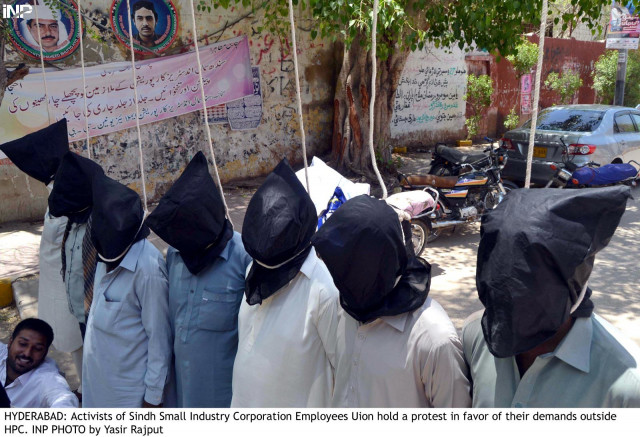The wrong hangings
There could be many among the 8,000 waiting on the death row, who deserve mercy rather than execution

There are those who may have suffered through a miscarriage of justice because of their poverty or because of the incompetence or corruption of our criminal justice system. One wonders how the cause of justice will be served by executing such persons. PHOTO: INP
The moratorium on the death penalty that had remained in place in Pakistan since 2008 was lifted in a state of national anger over the Army Public School massacre in which at least 132 students lost their lives. Though taken when the grief-stricken nation at large was full of rage, the decision, nevertheless, was meant to send to the gallows mainly the perpetrators of terrorism. However, since the lifting of the moratorium, the majority of the around 188 people who have been hanged were sentenced for being involved in non-terror related cases. Amnesty International has estimated that there are more than 8,000 such prisoners on death row in Pakistan.
The age-old controversy over whether the practice of hanging murderers serves as an effective deterrence sounds almost like a non-debate in the current context of the esteem now being globally attached to fundamental human rights. Most democracies in the world have abandoned the death penalty. The US, Japan, India and South Korea are the major exceptions here. Of course, many dictatorships, monarchies and theocracies in the world continue to enforce the death penalty. The most common and most cogent argument against capital punishment is that sooner or later, innocent people will get killed because of mistakes or flaws in the justice system. Witnesses, prosecutors and judges can all make mistakes. When this is coupled with serious flaws in the criminal justice system itself, which is the sad reality in Pakistan’s case, it is inevitable that innocent people will be convicted of crimes they have not committed. Where capital punishment is used, such mistakes cannot be corrected after the victim has been executed. There could be many among the 8,000 waiting on the death row, who deserve mercy rather than execution.
Among the many sentenced to death in non-terror related cases, there are those who suffer from serious psychosocial disabilities, and mental and physical disorders. There are those who may have been under-age at the time when they are said to have committed their crimes. There are those who may have suffered through a miscarriage of justice because of their poverty or because of the incompetence or corruption of our criminal justice system. One wonders how the cause of justice will be served by executing such persons.
The decision to lift the moratorium on the death penalty was accompanied by a suitable amendment to the Constitution for setting up military courts to speedily try those caught indulging in acts of terrorism. The amendment was justified on the grounds that the entire system — from the law-enforcement agencies to the prosecutors, to the judges — had been terrorised into a state of dysfunction, therefore, the need for military courts. But this amendment has been questioned in the Supreme Court. So, paradoxically, while murderers from among non-terrorists are being hanged without any regard to the various UN and EU Conventions that the country has signed, the lifting of the moratorium on the death penalty seems to have made no difference to those who indulge in acts of terror.
Published in The Express Tribune, August 2nd, 2015.
Like Opinion & Editorial on Facebook, follow @ETOpEd on Twitter to receive all updates on all our daily pieces.














COMMENTS
Comments are moderated and generally will be posted if they are on-topic and not abusive.
For more information, please see our Comments FAQ